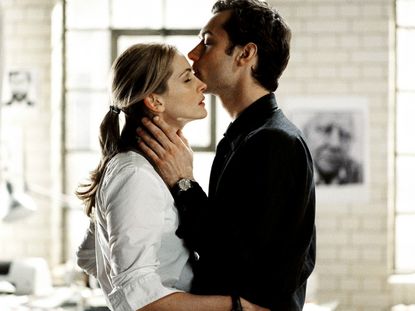Does infidelity have to mean the end?
Can a relationship ever truly survive an affair?

Can a relationship ever truly survive an affair?
When Alice Thomas’s* husband staggered home drunk one night at 4am, without having texted her to let her know where he had been, it was totally out of character. The two usually kept in constant contact via text, email and phone calls throughout the day, and going off radar for several hours – running the risk she’d worry he’d been in an accident – was not his usual style. For the rest of the night she couldn’t shake the question turning over in her head, and the next morning she confronted him with it: had he been with someone else? She eventually squeezed it out of Daniel that he had gone home with a woman he’d met in a nightclub after a boys’ night out. At the time, he insisted they hadn’t had sex – though, later, he admitted they had. ‘He was sobbing and saying sorry over and over again. I was hysterical with rage,’ she says. Even in her fury, though, Alice knew she didn’t want to leave Daniel, apart from anything else, they had a six-month old son. Nevertheless, she wasn’t optimistic that they could truly patch things up. This issue of whether a relationship can survive after an affair is more relevant today than ever, because people are being increasingly unfaithful – with some 20 per cent of men and 15 per cent of women under 35 admitting to infidelity, according to a report* (compared to 15 per cent and 12 per cent just over a decade ago). Some experts, such as marital therapist Andrew G Marshall, put this rise squarely down to social media, which make affairs infinitely more possible. The old cliché of discovering an affair after smelling someone else’s perfume has been replaced by finding a suspicious DM. But by whichever means the penny drops, it’s hard to understand how much pain the discovery of an affair can cause unless you’ve experienced it. ‘We believe good things happen to good people and an affair challenges our world view,’ says Marshall. ‘Suddenly, nothing makes sense. The world feels dangerous. We also see our partners as possessions. It’s terrifying for someone to take them from you.’

The emotional turmoil prompted by a sexual betrayal can be so acute that experts now have a term for it: post-infidelity stress disorder, which has similar symptoms to other stress-related disorders, including recurrent flashbacks (usually of events and moments that at the time seemed innocent), rage and despair. Alice and Daniel were at one of the classic points in their relationship where infidelity is more likely to occur: new parenthood. Other possible flashpoints are major life changes, such as redundancy, illness or even a promotion at work. But does infidelity always have to mean the end? The answer, typically, is complicated – even from the very beginning. The biggest error post-discovery is to either forgive your partner immediately or to throw them out straight away, says Marshall. ‘The moment you forgive someone you lose your bargaining power,’ he says. ‘While if you throw your partner out too quickly you won’t be able to make sense of it all.’ Married couples with families seem to have more reason to rebuild a relationship. But couples who have not yet had children are equally keen to try, according to psychotherapist Lucy Beresford. ‘You’ve already made a big emotional investment: you’re beginning to think about getting a home and having a family together. The prospect of going it alone can be very frightening.’

Typically, men and women’s reactions to infidelity differs. Men get upset about the physical relationship, whereas women tend to be hurt by the emotional betrayal. And it’s true that some people are more likely to be unfaithful – for example, if there is a family history of infidelity or they have unrealistic or over-romantic ideas about love. With Alice and Daniel, counselling failed (he walked out after two sessions), so they attempted to ignore their problems. ‘I always thought if he was unfaithful I would leave,’ says Alice. ‘I felt like a hypocrite for staying.’ This stage – in which couples endeavour to patch up their relationship without having resolved the underlying problems – is described by Marshall as ‘attempted normality’. Crucially, nothing has fundamentally changed. ‘If you haven’t sorted out the issues and are stuck in this stage, it will probably happen again,’ he says. And it did. Within a few months Daniel started wearing aftershave to work and keeping his mobile phone in his pocket at all times. One morning he accidentally left his phone on the kitchen counter. Alice discovered a flirtatious message from a woman. ‘I smashed his phone and stamped on it,’ she says. ‘After I had kicked him out, I threw his clothes in bin bags, flung them in a skip and hurled my wedding ring out the window.’ They had one last try ‘for the sake of the baby’, says Alice, and this time his behaviour was impeccable. But it was too late. The couple divorced last year. ‘Without trust, our relationship turned toxic,’ Alice says.

The evidence as to whether infidelity can ever actually have a positive impact on a partnership is conflicted. One survey* revealed that, among couples whose relationship recovered after an affair, 65 per cent felt that it was stronger, chiefly as a result of subsequent counselling. That said, only 31 per cent of marriages last afterwards. For some women – such as Sue Jenkins, a 35-year-old film director, an affair can even have a positive effect. ‘I married Michael for all kinds of reasons,’ she says. ‘Security, someone to build a life with. But the sex gets boring. I tell myself that as long as he doesn’t find out – and I only sleep with men who have more to lose than I do – it keeps me happy in our marriage. Do I feel guilty about it? A bit. But it works for me.’ In Marshall’s experience, only 20 per cent of men and women are unfaithful purely because they are in pursuit of sex. ‘Most affairs are about feeling helpless and neglected,’ he says. ‘You love your partner and don’t want to leave. The twisted solutions often seems to protect your marriage by having an affair. Sexual problems have an emotional route – the vast majority are actually [caused by] communication problems.’ It’s a view Lucy Beresford agrees with: ‘Infidelity is rarely about the excitement of sex for its own sake,’ she says. ‘Some people cheat because being in a couple feels too restrictive. Or they simply want the thrill of something new.’

For Marianne Wilson, a 28-year-old IT consultant, an affair was initially useful to try to remedy what was going wrong with her relationship. Having been with Jonathon, 31, for five years, she felt she was being taken for granted. She had a one-night stand with an ex she pumped into in a nightclub during a weekend back in her home town. ‘Nick was an ex-boyfriend I hadn’t seen for years,’ she says. The two downed soured apple liqueurs until, drunk and filled with a fleeting sense of freedom, Marianne went to Nick’s flat where they had sex. ‘It was thrilling. I felt guilty, but justified it to myself because there was no emotional attachment. It wasn’t really about sex, I realized it was indicative of problems in my relationship that I’d chosen to ignore, a way of asserting my freedom in a relationship that felt stifling.’ She didn’t tell Jonathon. ‘I didn’t see what either of us would gain,’ she says. ‘He would have been devastated and it would have detracted from the real issues’. Yet when she tried to persuade him to discuss their difficulties, she was met with resistance. ‘We sat in silence on the sofa. Our sex love tapered off and I couldn’t stop my mind drifting back to my one-night stand and the contrasting excitement.’ Her relationship limped on for another two years, ending only when Jonathon, a teacher, was offered a job in Italy last summer. ‘I don’t regret cheating,’ says Marianne. Without my one-night stand I wouldn’t have understood how much trouble my relationship was in. But I wish I had used it to end the relationship instead of trying to make it better.’

The truth about affairs and infidelities typically comes out in dribs and drabs – if at all (typically, only six per cent of men and women admit fully to an affair when first confronted). There is the debate, if you are the ‘guilty’ party, whether it’s better to confess. Most experts would say that coming clean is best, and Andrew C Marshall agrees: ‘Honesty takes the poison out of a relationship. Nine times out of 10, the partner suspects anyway and telling the truth gives you, for want of a better phrase, “honesty points”, which will be useful in the future.’ However, Marshall warns against confessing for yourself rather than for the sake of the relationship, adding ‘You can’t confess and expect to be given an award for your honesty. Your partner may well be devastated.’ Yet some relationships do survive. Samantha McCall, a 35-year old website designer, is married to Harry, 33, a computer programmer. She discovered Harry’s first affair two years into their marriage, when a woman sent her an email saying that he was planning to leave Samantha so that they could be together. Harry admitted a flirtation with a work colleague had spiralled out of control over the previous year, but insisted he had no intention of leaving. They went through marriage counselling. ‘Once issues in your relationship surface you can deal with them and make progress,’ says Marshall. ‘But it takes courage and it’s certainly not a quick fix. The process generally takes two years. Most people want it over and done with in two weeks.’
Marie Claire Newsletter
Celebrity news, beauty, fashion advice, and fascinating features, delivered straight to your inbox!

There is no definitive prognosis, of course, and the survival of a relationship can depend on many factors. A good start according to Marshall, is an appreciation of the other person’s situation – however difficult that may be. Even as the ‘wronged’ party, it helps to try to untangle and understand the reasons for the infidelity, and, for the one who was unfaithful, it’s important to try to understand why your partner feels so devastated and betrayed. Punishing the guilty partner is all too understandable, but best avoided, Marshall says: ‘It may just make them feel so unloved that they look outside the relationship – if that was the reason they were unfaithful in the first place.’ Above all, it is necessary to confront the difficult issues – the real reasons that the relationship went off the rails – and not bottle up feelings that, ultimately, will only lead to simmering resentment.
In counselling, Samantha realized that Harry’s affair was more about control than sex. ‘He got a kick out of the secrecy,’ she says. The couple made a concerted effort to be more open and their relationship revived, but a year later Samantha discovered a string of inappropriate messages on Harry’s phone. This time, she has found it harder to forgive, but she is still in the relationship and willing to see how things pan out. She tells us: ‘This sounds bad, but knowing harry is in the wrong puts me in a position of power. I don’t know what the future holds, but I’m happy to stay married – for now, at least.’

Whatever your view of Samantha’s choice, there are no hard and fast rules to whose relationship survives and whose doesn’t after an affair. Often, it’s a more difficult decision to stay and admit that some of the blame falls to the ‘innocent’ party, rather than to leave and accept no responsibility.
‘It’s easy to say you would leave in abstract terms,’ says Marshall. ‘But in a relationship you may feel differently. If you tell yourself you’re stupid you will feel terrible, however, if you decide to learn from the mistakes you both made, you can start to feel again.’
The leading destination for fashion, beauty, shopping and finger-on-the-pulse views on the latest issues. Marie Claire's travel content helps you delight in discovering new destinations around the globe, offering a unique – and sometimes unchartered – travel experience. From new hotel openings to the destinations tipped to take over our travel calendars, this iconic name has it covered.
-
 Anne Hathaway had to kiss 10 men during a 'gross' chemistry audition early in her career
Anne Hathaway had to kiss 10 men during a 'gross' chemistry audition early in her careerUgh
By Iris Goldsztajn
-
 There was a hidden code in Baby Reindeer that everyone completely missed
There was a hidden code in Baby Reindeer that everyone completely missedDid you spot it?
By Jadie Troy-Pryde
-
 I'm a Health Editor who's tried 100's of shoes - these are officially the best gym trainers you can buy
I'm a Health Editor who's tried 100's of shoes - these are officially the best gym trainers you can buyFor running, weight training, walking, and more.
By Ally Head